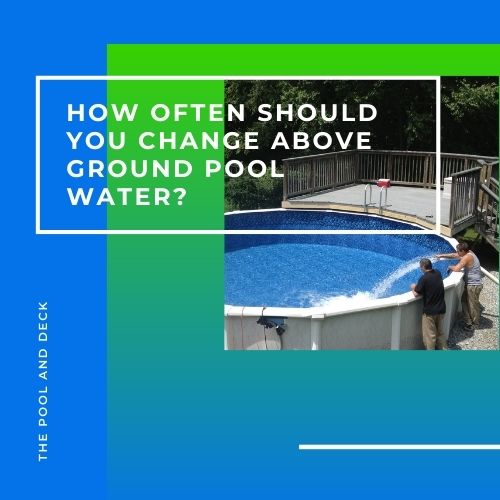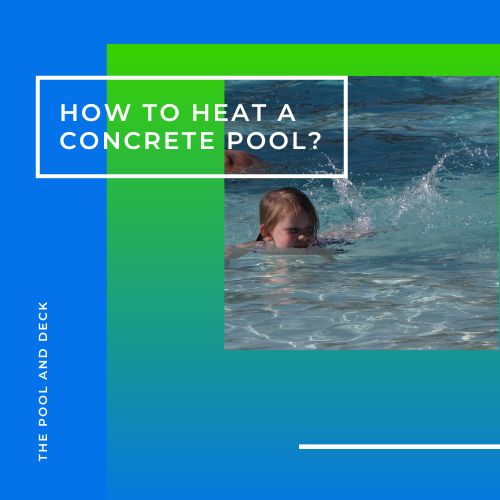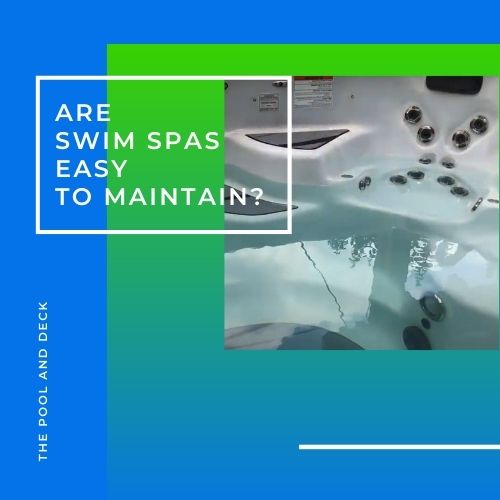How Often Should You Change Above Ground Pool Water? (Best Every Year!)
thepoolanddeck.com is a participant in the Amazon Services LLC Associates Program, an affiliate advertising program designed to provide a means for sites to earn advertising fees by advertising and linking to Amazon.com . The website is also an affiliate of a few other brands. The affiliate links never increase your purchase price. We do appreciate your support. Thank you very much!
Table of Contents
How Often Should You Change Above Ground Pool Water?
An above ground pool is a lot of fun during summer. But you have to make sure that the water in the pool is clean for swimming, at all times. Adding the required pool chemicals, especially chlorine, and running the pool pump for circulation, is absolutely essential for keeping your above pool sanitized. But how often should you change above ground pool water?
It is best to change above ground pool water once a year, before the pool season starts. Reduce the water level before winter, but do not completely drain the above ground pool before winter.

How Long Does Above-Ground Pool Water Last?
Your above ground pool loses water in more ways than you think.
A fair amount of water is lost when kids and, sometimes even, adults jump into the pool. Water fights, games such as water volleyball and general splashing around are all ways the above ground pool loses water. Even when the swimmers leave the pool gracefully, they carry some water on their hair, body & swimsuit.
Water evaporation is also responsible for a substantial loss of water from the above ground pool.
The evaporation rate from an outdoor pool varies depending on the pool’s temperature, air temperature and humidity, and the wind speed at the pool surface.
US Department of Energy
You can reduce water loss due to evaporation by using pool covers whenever the pool is not in use. A bubble (solar) cover is very cost effective.

24′ Round 12 Mil Clear Solar Pool Cover – $164.99
from: Pool Splash, LLC
A sand or DE filter needs to be cleaned periodically by backwashing. The pool water leaves the pool during backwashing. While backwashing is very important, you should only backwash when required. You not only lose pool water, you also lose expensive pool chemicals during backwash!
The amount of water an above ground pool loses, depends on:
- Number of swimmers using the pool
- Level of playfulness of swimmers
- Ambient temperatures
- Frequency of backwashing
You need to keep a watch on the water level in the pool and replenish it from time to time.
How Much Water Should I Leave in My Above-Ground Pool for Winter?
If you live in a place that has freezing winters then you’ll need to winterize your above ground pool. You should do that once the temperature falls and stays below 65°F for a week or two.
There are several actions that you need to take for correctly winterizing your above ground pool. Reducing the water level is one of them. You should drain the pool, such that the water level is 4 to 6 inches below the top of the skimmer.
This space is needed to allow for expansion when the pool water freezes. You risk damaging the pool and the cover if the space for expansion is not provided.
It is better to change the above ground pool water at the beginning of the pool season. Leave water in the pool during winter, at a slightly reduced level. Your above ground pool will be safe during winter.
Just make sure that you have balanced the water chemistry before winterizing and installed a good quality pool cover. Shocking the pool before winter will keep bacteria and algae in check, while the pool cover will prevent contamination from falling leaves, insects and other small animals.
Is It OK to Leave an Above-Ground Pool Empty?
Never drain the above ground pool completely. The water within the pool creates an outward hydrostatic pressure on the pool walls & structure to keep it stable. If the pool is emptied then the outward pressure disappears and the stability is lost. There is a risk of pool walls coming off the track and crumbling in.
The vinyl pool liner is not UV resistant. An empty above ground pool exposes the vinyl pool liner to sunlight and the weather elements. The liner can fade, wrinkle or get damaged by debris or small animals such as squirrels or rats.
At the very least, you should leave a few inches of water in the above ground pool and that too only for very short periods of time.
However, the best way to prepare your above ground pool for the winter is to reduce the water level by 4 to 6 inches below the skimmer level. Balance the water chemistry, cover the pool and disconnect all electrical equipment. You will be good to go.
Keep a check on the pool cover. During fall & winter, dry leaves & twigs will accumulate on it. Rainwater and snow can also pile up on the pool cover. Scrape off all that stuff at regular intervals, using a brush.
Thank you very much for reading the post. I do hope you found it informative and helpful.







